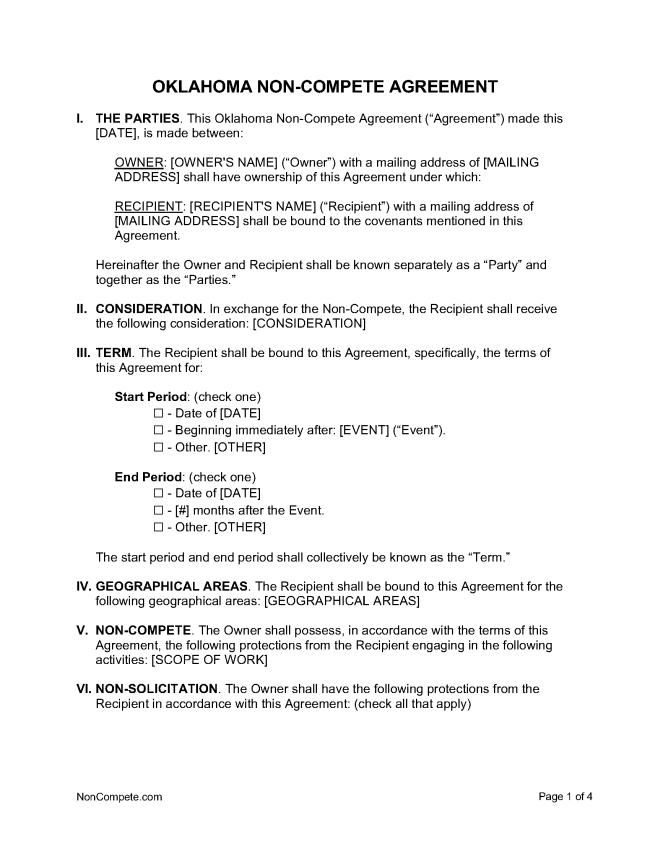An Oklahoma non-compete agreement is a partial restraint of trade that limits an entrepreneur or worker from pursuing some business opportunity. Oklahoma law has long been strict about non-compete agreements, and its current statutes limit what kinds of agreements are valid.
Additionally, because there is some confusion about the application of previous rules since the legislature updated the regulations in 2001, and because additional legislation is pending, assistance from a local attorney will be valuable in creating an agreement.
Table of Contents |
Are Non-Competes Enforceable in Oklahoma?
Most non-compete agreements are not enforceable in Ohio. (Okla. Stat. Ann. tit. 15, § 217). Non-compete agreements may be enforceable in the following situations:
- The sale of the good will of a business (Okla. Stat. Ann. tit. 15, § 218)
- The dissolution of a partnership (Okla. Stat. Ann. tit. 15, § 219)
However, case law on non-compete agreements also suggests that reasonable agreements are not considered full restraints of trade and are therefore enforceable. (Bayly, Martin & Fay, Inc. v. Pickard (1989)).
There is case law suggesting the old “reasonableness standard” does apply to current non-compete agreements (Vanguard Environmental, Inc. v. Curler (2008)). There’s also case law suggesting Oklahoma prohibits non-compete agreements in employment (TruGreen Limited Partnership v. Oklahoma Landscape, Inc. (2021)).
Non-Solicitation
Under Oklahoma law, non-solicitation agreements are not considered non-compete agreements and, therefore, can be enforceable contracts against former employees in the following situations:
- Directly soliciting the established customers of the former employer (Okla. Stat. Ann. tit. 15, § 219(a))
- Actively or inactively soliciting the employees or independent contractors of the former employer (Okla. Stat. Ann. tit. 15, § 219(b))
Territorial Restrictions
Non-compete agreements that are valid under the sale of the good will of a business exception (Okla. Stat. Ann. tit. 15, § 218) and the dissolution of a partnership exception (Okla. Stat. Ann. tit. 15, § 219) can apply to, at most, a specified county, and counties that border it.
Public Policy
While a non-compete agreement that prevents soliciting a former employer’s customers does not violate public policy, an agreement that prohibits an employee from working in the same or a similar field as the former employer does and is not enforceable. (Scanline Medical, L.L.C. v. Brooks (2001))
Prohibited Professions
Non-compete agreements that limit an attorney from representing a client are void when contained in:
- An employment contract or partnership agreement (Rule 5.6(a), Oklahoma Rules of Professional Conduct), or
- A case settlement (Rule 5.6(b), Oklahoma Rules of Professional Conduct).
However, reasonable restrictions are allowed in agreements concerning retirement benefits or contracts for the sale of a law practice. Rule 5.6(a), Oklahoma Rules of Professional Conduct.
Terminating an Employee
It is unclear under Oklahoma law whether a valid non-compete agreement remains enforceable if the employer terminates the employee.
Burden of Proof
It is unclear who has the burden of proof in situations where the enforceability of a non-compete agreement is at issue. Some case law suggests that if a party plans to argue that an otherwise valid agreement is unenforceable on antitrust grounds, that party has the burden of proof. However, it is unclear how applicable this is to the current statutes. (Teleco, Inc. v. Ford Industries, Inc. (1978)).
Continued Employment (consideration)
Because of the limitations of Okla. Stat. Ann. tit. 15, § 217, it is unclear whether continued employment constitutes adequate consideration for a non-compete agreement.
Maximum Term
There is no maximum length of a non-compete agreement. If the agreement is valid, every case is evaluated independently, but non-compete agreements may only last long enough to protect a business from unfair competition.
In Cardiovascular Surgical Specialists, Corp. v. Mammana (2002), the Oklahoma Supreme Court ruled that a two-year restriction on a specialty surgeon was unreasonable. Longer terms, such as a five-year term in Vanguard Environmental, Inc. v. Curler (2008), have also been found unreasonable.
Blue Penciling (allowed)
Courts are empowered to modify non-compete agreements but must leave the agreement unenforceable if deleting a word or phrase to make the agreement enforceable would leave additional questions. (Autry v. Acosta, Inc. (2017)).
